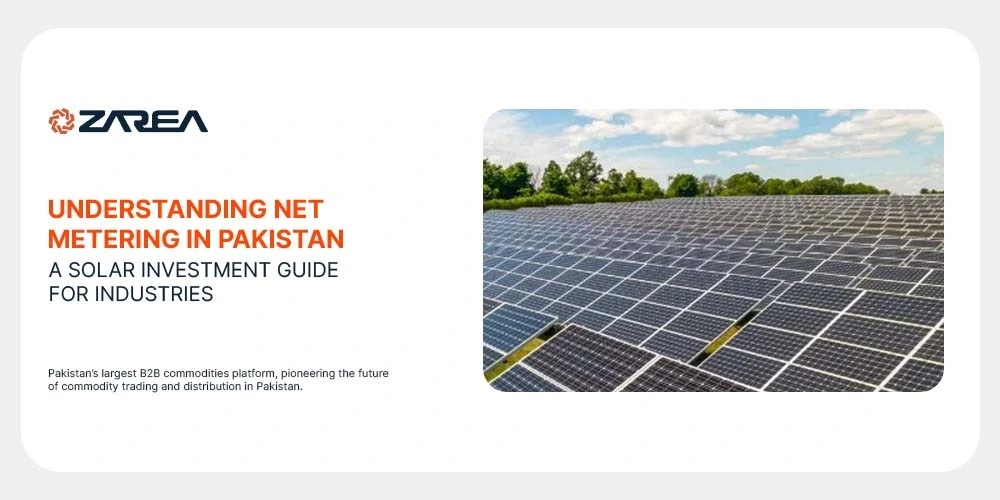Introduction – Solar Investment:
The industrial sector is still suffering from high electricity costs and an unstable supply as Pakistan struggles with an ongoing energy crisis, rising fuel prices, and frequent power outages. Solar energy is becoming seen as a viable and sustainable solution to these problems. Net metering is one of the most potent forces behind this shift; it is a policy that maximises solar investment profits for businesses while simultaneously promoting sustainable energy.
We explain what net metering is, how it operates in Pakistan, and why it’s revolutionising the market for companies looking for affordable energy solutions in this guide.
What is Net Metering?
A billing system called net metering enables people or companies who use solar panels to produce their own power to send excess energy back into the national grid. They get credits in exchange, which they may use to reduce their electricity costs. Simply simply, you only pay for the “net” amount of power you utilise from the grid—hence the phrase “net metering.”
This implies that industrial users may transfer any excess solar energy produced during the day to the grid and use it later when solar output is low, as at night or on overcast days.
Net Metering in Pakistan – Legal Framework:
According to the rules set forth by the National Electric Power Regulatory Authority (NEPRA), the government formally implemented net metering in Pakistan in 2015. Local Distribution Companies (DISCOs) like LESCO, K-Electric, IESCO, and others carry out the procedure, and NEPRA governs and oversees it.
Important attributes:
Eligibility: Customers with a 1 kW to 1 MW solar system are eligible.
Duration of License: 3 years (renewable)
Restitution: Export units are credited at the rate authorised by NEPRA.
Type of Meter: To record import and export, bi-directional meters are installed.
Note: Businesses may now legally profit from their solar power systems and lessen their reliance on the national grid thanks to this regulation.
Why Net Metering is a Smart Solar Investment for Industries:
Industrial power users frequently pay some of the highest rates in the nation. Because of this, solar energy is not only a cost-effective investment but also a sustainable one. This is the reason:
High Price Savings
Businesses that use solar power with net metering see a significant drop in their monthly electricity costs. Net metering may sometimes cut a facility’s power use from the grid by more than 60%.
Fast ROI (Return on Investment)
Depending on system size and usage patterns, industrial solar systems with significant energy consumption can frequently break even in three to five years.
Self-Sufficiency in Energy
By producing and controlling their own energy, businesses lessen their susceptibility to: Failures of the grid Shedding of loads Volatility of fuel prices
Adherence to Environmental Rules
There is currently growing pressure on many industrial sectors to implement environmentally friendly practices. In addition to helping businesses achieve their environmental objectives, solar energy with net metering enhances brand recognition.
How to Get Net Metering Approval in Pakistan:
Here is a detailed guide on how businesses can apply for net metering:
Step 1: Installing a Grid-Tied Solar System
Collaborate with a qualified solar contractor
Verify that the system satisfies NEPRA and DISCO specifications.
Step 2: Apply to Your Local DISCO
Send in your application together with the technical specifications, system design, and local authorities’ NOC.
Step 3: Technical Assessment
After examining the system, DISCO certifies that connecting to the grid is safe.
Step 4: Installing a Bidirectional Meter
A net meter is installed by DISCO to track energy intake and outflow.
Step 5: NEPRA grants a three-year generation licence for net metering
The system is prepared to export power and generate credit when this procedure is finished.
Challenges and Considerations:
Despite the obvious advantages of net metering, industries should be mindful of the following issues:
The initial outlay of funds
Large-scale solar projects need initial funding. However, this is becoming increasingly affordable due to favourable financing options and declining panel prices.
Technical Adherence
In terms of system design, safety features, and inverter compatibility, certain requirements must be fulfilled.
Insufficient Awareness
Adoption is slowed by the fact that many industrial users are still ignorant of the full advantages of net metering.
Future Outlook – A Growing Opportunity for Solar Investment:
The energy mix in Pakistan is changing. The government is promoting the use of renewable energy in light of the frequent power outages and growing electricity rates. By 2030, NEPRA wants to see 30% of the nation’s electricity come from renewable sources. One essential technique for achieving this goal is net metering.
Furthermore, Pakistani solar investment is becoming more and more attractive to both domestic and foreign investors, especially in the commercial and industrial sectors, as a high-return potential.
Zarea’s Perspective:
Zarea, the top B2B commodities platform in Pakistan, is a prominent advocate for the industrial sector’s embrace of sustainable energy. We think that investments in solar and net metering are not only economically feasible, but also essential to the advancement of the country. Industries have the power to shape Pakistan’s future via creativity, sustainability, and wise energy decisions.
Final Thoughts:
In Pakistan, net metering is more than simply a legal tool; it’s a means of achieving long-term savings, energy independence, and sustainable growth. It gives businesses a clear way to save energy expenses and help create a cleaner, greener future.
Industrial players may change their operating expenses and environmental effect by fusing the advantages of net metering with the power of solar energy. Investing in solar now ensures a more robust tomorrow, regardless of whether you’re a corporate site, textile mill, or industrial plant.
































